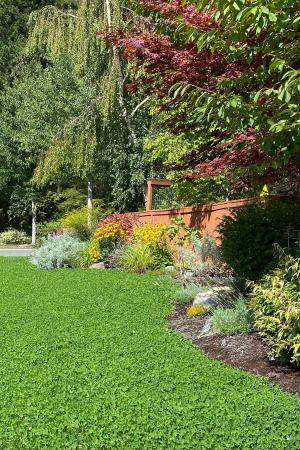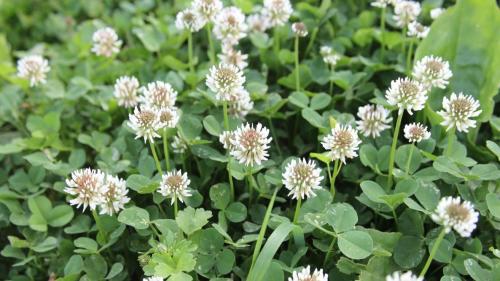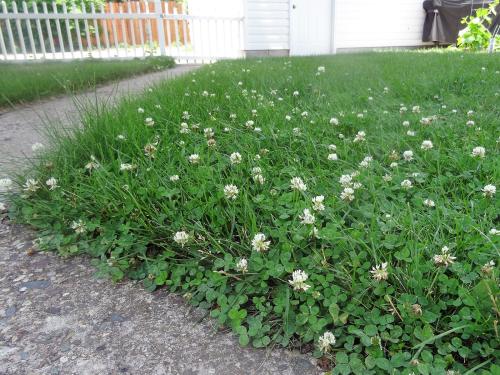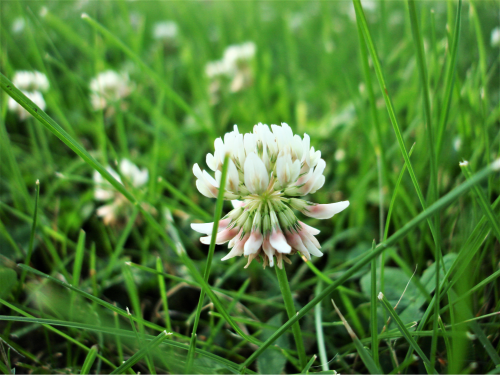A guide on everything you need to know about clover lawns.
Over time, clover has gained an unfavorable reputation, but did you know it was once a standard component in grass seed mixes?
A Little About The Clover Lawn
Before the development of weed control methods and the idea of a flawless lawn being 100% grass, grass seed blends often contained 5% (or even more) white clover. Discover more about choosing the right grass seed.
In reality, some individuals choose to establish a clover lawn using clover grass seed to cultivate a lawn mainly or entirely made up of diverse clover varieties. Dutch white clover, mini clover, and micro clover are among the most prevalent types used in a clover yard.
Discover Lawn Care Services Near You
| Pros: | Cons: |
|---|---|
|
|
How To Plant A Clover Lawn
Planting Clover Ground Cover can help turn your lawn into a pollinator oasis.
A clover lawn is an excellent choice for conserving water, supporting pollinators, and enhancing soil quality. Plus, maintaining a clover lawn is a breeze once you grasp the essentials of clover lawn care.
Tips for Planting a Clover Yard
Clover seeds typically grow well with minimal maintenance. If you're shooting for a robust, densely packed lawn of clover, though, a little effort goes a long way. Attending to the soil, planting in the right season, and following cultural practices can encourage clover to flourish in your lawn.
Planting Tip: Season
Planting seeds in late spring will give you the best chance of creating a thick clover lawn. Specifically, clover seeds grow best when planted after the last frost, when temperatures will stay above 40°F for the rest of the season.
Planting Tip: Soil
Test your soil and make any necessary adjustments to bring it within a pH range of 6 to 7. That's when clover grows best. You can purchase a pH meter or soil test kit to figure out the current pH of your lawn. You can also engage a lawn care company to perform a pH test. If you find that your soil is outside the 6–7 pH range, adding peat moss will increase acidity (and lower pH) and adding lime will increase alkalinity (and raise pH).
Cultural Practices Regarding Clover Lawns
Once the weather warms and the pH is just right, it's time to plant your clover seeds. Spread seeds generously over your lawn, and then rake the newly seeded areas to help the seeds penetrate the soil. Water your lawn every day thereafter until you start to see clover sprouts. Germination usually occurs within 2 weeks. Once the young plants put out leaves, reduce the watering regimen to about once a week.
Caring for Your Clover Yard
How to care for a clover lawn without breaking the bank.
After establishing your clover lawn, follow these simple maintenance tips to keep it flourishing and looking its best:
- Mow consistently, about once a month, to maintain a neat appearance and prevent overgrowth.
- During dry spells, water your lawn regularly, ensuring the water penetrates deeply enough to reach the clover's roots.
- Apply a light fertilizer annually, preferably in the spring, to maintain a healthy lawn.
- Although clover lawns are generally low in weeds, occasional hand-weeding may be necessary to remove any unwanted growth without damaging the clover.
With proper care and attention, your clover yard will thrive, offering you an attractive, eco-friendly outdoor space for years of enjoyment.
Discover Lawn Care Services Near You
Looking for help to control your clover lawn? Contact us to have our seasoned technician assess the unique needs of your lawn. Call now 800-989-5444!
Clover Lawns: A History and Guide
The old clover lawn makes a resurgence.
The idea of an all clover lawn may sound strange. However, our modern lawns would have seemed strange to people just a few dozen decades ago. The vision of an American lawn as a uniform bed of single turf grass is actually a preference transplanted from France and England.
Aristocrats in these countries turned wild countryside, which was populated with numerous species, into highly cultivated, rolling lawns of just grass. They found the clean, cropped lines of a lawn more aesthetically pleasing than the frenetic richness that mother nature provided(And if you can relate, check out our best lawn mowing tips).
Americans then began to imitate the French and English style in the 1800s, as it had become a sign of wealth to have a carefully cultivated lawn. The meadows of America, of which clover was a part, were gradually mowed and trimmed into the typical vision of a lawn we have today.
This European influence may play a part in why some people find clover unsightly today. Really, though, the idea that a lawn must contain just one kind of plant was an arbitrary cosmetic preference that just happened to catch on.
In recent years, there has been a resurgence of interest in clover lawns as people have become more aware of the environmental benefits of these plants. Clover lawns are more drought-tolerant than traditional lawns, and they require less water and fertilizer. They are also a good source of food for pollinators, such as bees and butterflies.
With a little care and attention, you can create a beautiful and low-maintenance clover lawn that will benefit your environment and your wallet.
Deciding If Clover is the Right Choice for Your Lawn
Should you go clover?
As evident, the decision to use clover isn't straightforward. However, enough information is available to help you make an informed choice about incorporating clover into your lawn.
If you're still unsure about clover, explore our suggestions on how to eliminate clover from your lawn.
Before introducing clover to your lawn or garden, ensure it's the right decision, as clover removal can be quite challenging. Regardless of your stance on clover, reach out to your local NaturaLawn of America branch to bring your lawn vision to life.
Frequently Asked Questions About Clover Lawns
What is a clover lawn?
A clover lawn is a type of lawn that consists primarily or entirely of clover plants, which are legumes that can provide a low-maintenance, eco-friendly alternative to traditional grass lawns.
What are the benefits of having a clover lawn?
Clover lawns have numerous benefits, including improved soil fertility due to nitrogen fixation, drought tolerance, reduced need for mowing, natural weed suppression, and attraction of beneficial pollinators such as bees and butterflies.
Are there any downsides to having a clover yard?
Some potential downsides of a clover lawn include its tendency to attract bees (which may be an issue for those with allergies or concerns about pets and children), its invasive growth pattern, and its potentially uneven appearance compared to a traditional grass lawn.
How do I plant a clover lawn?
To plant a clover lawn, start by testing your soil to ensure it has a pH range of 6 to 7, which is ideal for clover growth. Sow clover seeds in late spring, following the last frost, and distribute them evenly across your lawn. Rake the seeded areas gently and water your lawn daily until clover sprouts emerge.
How do I care for a clover lawn?
Caring for a clover yard involves mowing it consistently (about once a month), watering during dry spells, applying a light fertilizer annually, and hand-weeding occasionally to remove any unwanted growth without damaging the clover.
Can I mix clover with grass seed for a more diverse lawn?
Yes, you can mix clover with grass to create a more diverse and eco-friendly lawn. This combination can improve soil fertility, reduce the need for fertilizers, and create a more drought-tolerant lawn.
Is a clover lawn safe for pets and children?
Clover lawns are generally safe for pets and children. However, be cautious if you have family members who are allergic to bee stings, as clover attracts bees due to its flowers.
Can a clover lawn help reduce weeds in my yard?
Yes, clover lawns can help suppress weeds due to their dense root structure and ability to outcompete many common weeds for resources.
Will a clover lawn stay green during drought conditions?
Clover lawns are more drought-tolerant than traditional grass lawns and can stay green even during dry spells with minimal watering, making them an attractive option for those in areas with water restrictions or dry climates.
Should I plant a clover lawn or grass?
The decision to plant a clover lawn or grass depends on your priorities and preferences. If you're seeking a low-maintenance, eco-friendly option that improves soil fertility, conserves water, and supports pollinators, a clover lawn is an excellent choice. However, if you prefer a more traditional lawn appearance and aren't concerned about attracting bees, a grass lawn may be more suitable for your needs.
Key Takeaways About Clover Lawns
- Clover yards were once standard components in grass seed mixes and offer numerous environmental benefits, such as conserving water and supporting pollinators.
- Planting a clover lawn involves testing the soil for optimal pH, sowing seeds in late spring, and watering regularly until sprouts emerge.
- Maintaining a clover lawn requires minimal effort, such as consistent mowing, occasional watering during dry spells, and annual light fertilization.
- Clover yards are low-maintenance, drought-tolerant, and provide a natural source of food for pollinators like bees and butterflies.
- Deciding to use clover in your lawn requires careful consideration, but resources and expert advice are available to help make an informed choice.
Looking for help getting the lush lawn you've always wanted? The lawn care experts at NaturaLawn of America provide environmentally friendly lawn care at an affordable price. Contact us to have our seasoned technicians assess the unique needs of your lawn.
NaturaLawn of America
NaturaLawn.com
800-989-5444
References
- How To Plant A Clover Lawn - B,H & G
https://www.bhg.com/how-to-plant-a-clover-lawn-6750469 - Guide To Clover Lawns - Masterclass
https://www.masterclass.com/articles/clover-lawn-guide - How To Establish A Clover Lawn - EarthEasy
https://learn.eartheasy.com/articles/how-to-establish-a-clover-lawn/ - History Of Clover Lawns - The University of Maryland
https://extension.umd.edu/resource/lawns-and-microclover - The History Of Clover Lawn Trends - Case Western Reserve University
https://thedaily.case.edu/historys-ted-steinberg-discussed-the-trend-of-clover-lawns/











